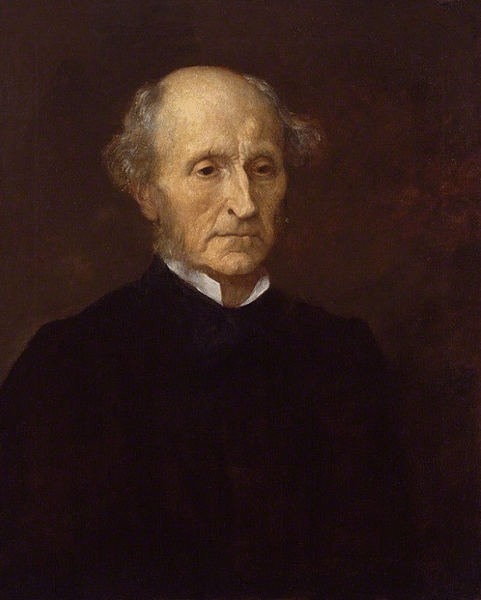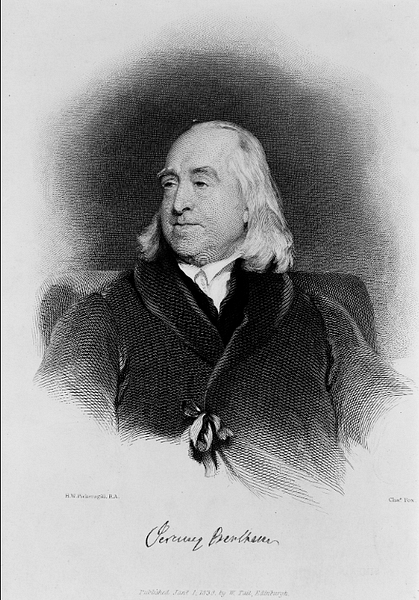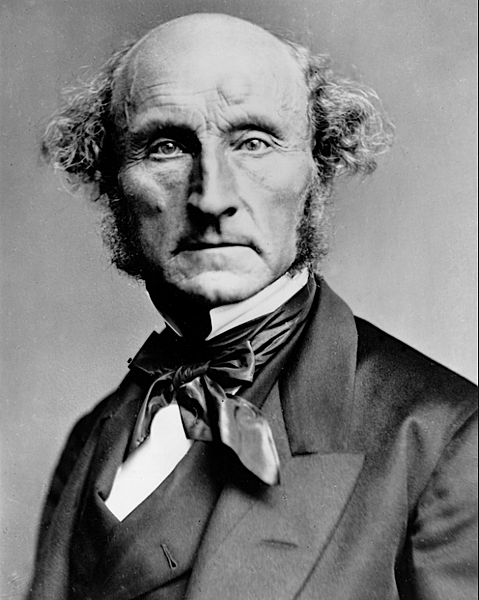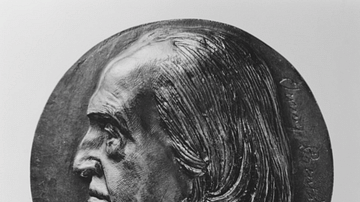
John Stuart Mill (1806-1873) was a highly influential English philosopher of the Victorian Era. His writings were influenced by the Enlightenment thinkers and German Romanticism. Besides philosophical works, he wrote on mathematics, language, and logic. Well ahead of his time, he advocated the abolition of slavery and was a proponent of both children's and women's rights. However, he is best remembered for his essays on utilitarianism, a philosophy developed by Jeremy Bentham (1748-1832).
Life
Born on 20 May 1806 in London, England, John Stuart Mill was the son of the Scottish radical thinker James Mill. James had moved to London to promote Bentham's utilitarian philosophy. Through his father's use of the Socratic method, John was educated by James in the psychological and educational principles of utilitarianism. He was schooled in law, psychology, economics, mathematics, and logic. Scholar Jeremy Stangroom, in his The Great Philosophers, wrote that Mill's father's aim was to turn him into a calculation machine. Some believe James accomplished his goal. At the age of three, he read Greek, and at age eight, Latin. By the time he was 14, he had read most of the classic Greek and Latin texts in their original languages. Later, while still in his teens, he edited many of Bentham's unpublished manuscripts.
Like his father, at age 17, he began to rise through the ranks of the British East India Company, remaining there until it closed in 1858. He suffered a nervous breakdown when he was 20. Many believe his repeated bouts of depression were a reaction to the impersonal disciplined teaching of his father and the overwhelming domination that his father imposed on everything in his life. In his The Great Philosophers, Jeremy Stangroom wrote that Mill had been prepared for argumentation and analysis but received no training to help him cope with emotional moods. Luckily, his newfound interest in culture, theater, and the works of English poet William Wordsworth (1770-1850) helped him escape his depression.
In 1852, he married a long-time friend, Harriet Taylor, two years after the death of her first husband. She proved to have a significant influence on Mill as his foremost consultant and critic. She died in 1858. Seven years later, he became a member of Parliament (1865-1868) serving only one term. Mill died on 8 May 1873 in Avignon, France. Among his major works are A System of Logic (1843), On Liberty (1859), and The Subjection of Women (1869).
Utilitarianism
Utilitarianism was founded by Jeremy Bentham. He was born in London and educated at Oxford. Like Mill, he was a lifelong, active reformer, proposing changes to education and the prison system, his Panopticon where prisoners were watched 24 hours a day. He also supported changes to laws on the treatment of animals. Bentham founded the basic principle of utility, which states that the goal of humanity is the attainment of pleasure with the absence of pain. It is a philosophy closely related to consequentialism which asserts that the action of an individual is morally right or wrong based on its consequences.

Utilitarianism asserts that all that matters, morally speaking, are the consequences of our actions and the degree to which they increase or decrease happiness. An individual's motives are irrelevant. This concept became known as social hedonism or the maximizing of pleasure over pain. The greatest amount of happiness for the greatest number of people – the more happiness an act provides, the more moral it is. This was inconsistent with Immanuel Kant's belief that the consequences of an action are morally irrelevant and morality is rooted in reason. To determine what the morally right course is in any circumstance, Bentham created the felicific calculus, an algorithm for quantifying pleasure.
In his essay Utilitarianism, Mill defined utilitarianism:
The creed which accepts as the foundation of morals, Utility or the Greatest Happiness Principle, holds that actions are right in proportion as they tend to produce happiness, wrong as they tend to produce the reverse of happiness. By happiness is intended pleasure, and the absence of pain, by unhappiness, pain, and the privation of pleasure.
(Selected Writings, 146)
There were two types of utilitarians: Bentham was what is called an act utilitarian where every action should be judged solely on the ability to produce the greatest happiness. Conversely, Mill was a rule utilitarian; he believed a person should have rules or guidelines that will help produce the greatest happiness; a person must seek to discover these general rules. Stephen Law, in his The Great Philosophers, wrote that one aspect of utilitarianism that both act and rule utilitarians followed is that it "dispenses with the need to introduce any supernatural being or dimension to the universe in order to accommodate morality … in order to evaluate the extent to which something is morally right or wrong, we need not focus on anything other than what takes place in the natural world" (119).
Types of Pleasure
Although Mill agreed with the basic principles of utilitarianism, he differed with Bentham in that he believed there were various types of pleasure. He considered some pleasures to be of higher or finer quality than others, placing more emphasis on the intellectual or cerebral pleasures of thoughts, feelings, and imagination.
In further expansion of one of Bentham's views, Mill wrote that an individual has to consider the quality of the pleasure not just the quantity – its duration and intensity. Bentham saw no difference between either quality or quantity. To Mill, pleasure is desired by everyone, but there is a clear distinction between what exactly pleasure is. To Bentham, as explained by Law, listening to Mozart and reading Proust is no different than eating chocolate. All that matters is the duration and intensity of the pleasure produced. However, Mill contended that the more cerebral pleasures should be given more weight than those of the body and senses. Some lower pleasures appeal to a person's "animal nature" while higher pleasures appeal to a person's "higher, noble human capacities."

Mill admitted that many people prefer the lower pleasures over the higher ones, but he does not consider these people to be competent judges. They have never been given the opportunity to acquire a taste for the higher pleasures. Once the individual experiences both, they will prefer the higher ones. However, one criticism of Mill was that many people, even those who have experienced both, still prefer the lower pleasures.
Liberty
Individual liberty was important to Mill. He believed that curbs must be placed on the powers of the government. Only when it is necessary to prevent one person from harming another should the government exercise power over the individual. According to the harm principle, one should be able to do what one wants, even jeopardizing one's own happiness, as long as one does not harm anyone else. In his essay On Liberty, he wrote:
...the only purpose for which power can be rightfully exercised over any member of a civilized community, against his will, is to prevent harm to others. His own good, either physical or moral, is not a sufficient warrant.
(Selected Writings, 8)
Mill asserted that "Over himself, body and mind, the individual is sovereign" (Magee, 184). One has a responsibility for oneself, one's actions, and pursuit of pleasure. Individuals must be free to pursue their own aims and self-development which are among the essentials of human well-being.
Tim Jackson, in his Philosophy, wrote that in the late 19th century in Britain, the government believed it had a moral duty to keep people on a righteous path. This is totally out of line with Mill's principles. Mill considered being forced to live in accordance with the will of the majority is the same as living under tyranny. He thought that the political freedom of expression and suffrage encouraged the development of the moral character of individuals and the society. While he considered government and the rule of law essential to protecting liberty, the government is also the chief threat to liberty:
The only freedom which deserves the name, is that of pursuing our own good in our own way, so long as we do not attempt to deprive others of theirs or impede their efforts to obtain.
(Selected Writings, 10)

Both Bentham and Mill believed that everyone, regardless of their race, gender, or social status, had an equal right to happiness. Few things were as important to Mill as equal rights for women. In his essay The Subjection of Women, he wrote that he believed in the equality of women:
...from the very earliest period when I had formed any opinions at all on social or political matters … That the principle which regulates the existing social relations is the two sexes — the legal subordination of one sex to the other — is wrong in itself, and now one of the chief hinderances to human improvement.
(Selected Writings, 77)
Stephen Law quoted him as saying, "It is better to be a human being dissatisfied than a pig satisfied, better to be Socrates dissatisfied than a fool satisfied. And, if the fool, or the pig, are of a different opinion, it is because they only know one side of the question" (118). Strongroom interpreted this to say that "the painful life of a dissatisfied intellectual is to be preferred to an idiot's life of pleasure" (98).
Criticism
Of course, utilitarianism had its critics, and Mill was not without his. Some critics believed that the idea that pleasure is the only good was wrong, and a person can find goodness in other areas that may or may not necessarily bring happiness such as the concepts of beauty and justice. Others disagreed with Mill's ethical principle, considering it too demanding. If every action must work toward an increase in pleasure and decrease in pain, then everyday behavior would turn out to be immoral.
Stephen Law disagreed with utilitarianism and presented scenarios that demonstrated how people have fundamental rights, such as the right to life and to justice. In one scenario a doctor has six patients: one has a minor medical condition while the other five need organ transplants – organs compatible with the first patient. Should the good doctor sacrifice the first patient to save the other five? Should the sacrifice of the one to save the five be morally right? Surely, the five would find happiness in receiving a transplant; however, the sacrificed patient definitely would not. In a similar situation – the trolley problem – one person may or may not be sacrificed to save five. The question again is one of which is morally right.
Mill was ahead of his time on a number of issues. He believed in liberty and the estsblishment of rights for women and children. Many of his ideas did not come into being for decades.







